
The dominating practice in Search Engine Optimization is keyword research. Identifying the right keyword is a process used to find famous ‘words’ and ‘phrases’ (Keywords) people enter into search engines to find relevant information. These keywords are then used to create and optimize content to rank in the search engines. It helps you to identify search queries of your target audiences.
It becomes increasingly difficult to optimize and drive traffic to your website without knowing the keywords for which you need to rank. The target phrases for link building, content creation, and overall digital marketing strategy revolve around keyword research.
For example, if you are a photographer and have created a website offering photography services, you know everything related to your profession. You know your unique services or skills and what people are looking for in photography services. Then portrait photography, pre-wedding/post-wedding photography, baby photography, aerial photography, candid photography, etc., constitute primary keywords for your website. Researching these keywords helps dig deeper into other keywords that can be used strategically to optimize your website.
The research put into keywords has immense potential to impact every SEO activity you will be performing to increase the reach and traffic of your website. A keyword is not limited to on-page optimization or content creation, but it also has an essential stake in link building, email outreach, search engine ranking, and so on. Keywords fuel your SEO strategy; they decide where to reach and whether you are moving ahead or not. Keyword research is the epitome of market research.
Here are a few reasons to understand why keywords are important
The keyword research tools you use could directly impact the data quality you will gather. A good keyword research tool offers actionable insights for specific keywords or a specific search query.
It also helps identify potential keywords that would otherwise be neglected.
But the question is which tool to choose. To make an informed decision, you must have an in-depth understanding of popular keyword research tools. That is why we will discuss the top five keyword research tools available. You can decide and proceed with the most effective keyword strategy based on the information provided.
Check out this article for the top 13 free keyword research tools.
Google Keyword Planner, previously known as Google Keyword Tool, is a potent tool. It suggests keyword ideas that you will seldom find with another tool.
Pros
Cons
SEMRush is an excellent keyword research tool if your business has no physical boundaries. The keyword ideas you get through this tool.
Pros
Cons
Compared to similar tools, Ahrefs has the most accessible navigation. With this tool, you can understand the value of using search traffic potential instead of focusing on the search volume.
Pros
Cons
Spyfu is bundled as a well-designed SEO tool with all the essential features and metrics for more profound keyword research to run paid ad campaigns. It is the best tool for small or midsize businesses to generate killer keyword ideas.
Pros
Cons
The automated keyword research process provides a holistic approach, valuable data, and actionable insights, making Moz Keyword Explorer stand taller in the competition. Use it to analyze a keyword’s competitiveness and understand the worth of low-hanging fruit.
Pros
Cons
Keyword research has become an integral part of online marketing. It helps website owners create a good SEO and paid ad campaign keyword list. Additionally, it also gives a fair idea for content creation.
However, if you intend to learn how to do keyword research, that is precisely what we will discover here.
To get into the nitty-gritty of keyword research, first, you need to develop a list of related and relevant keywords to your business.
For example, you are offering photography services.
You will have a clear idea of what search terms people might use to find photography services or photographers.
Some of the search phrases that instantly come to mind are
NOTE: These are not the keywords to target. These are just a few keyword ideas for which you will research the final keywords.
Google improves the search experience for searchers and digital marketers by significantly enhancing the search process.
Google suggests an algorithm-generated process wherein, if you start typing a search query, it shows specific predictions based on several objective factors, including how often and how common a search query was for past searchers.
The process is completely automated without any human involvement. Often, you will see specific search queries appearing in autocomplete even though they are not available in trending Google search trends.
Just copy some of the autocomplete suggestions that you think are relevant to your business or SEO motive.
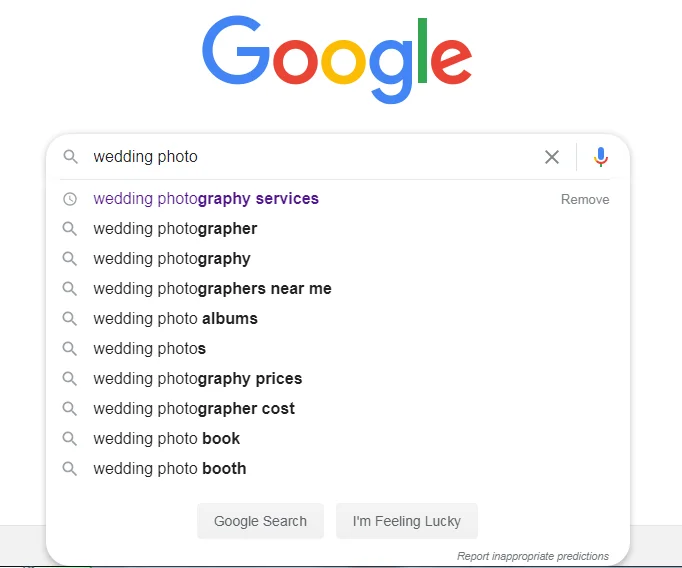
This is again a new and cooler method to research keywords without much effort.
After typing a search query in the Google Search box, you get all the ranking results for that search query along with few paid adverts.
Go to the bottom section of the search results where you will find “Searches related to” your search query.
There you will find a set of eight keyword phrases that are closely related to your keyword.
These are the search queries used by people when they were using your search terms.
Again, these keywords are auto-generated by Google based on search trends.
As the data is coming directly from Google, never doubt its authenticity.
Click on the suggested keywords and you will get a new search result page having new searches related to that search query.
Note down some of the most relevant search queries for further research.
For example, your search query was “Wedding Photography Services”.
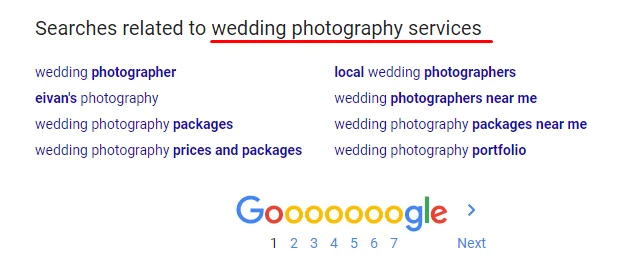
Google Keyword Planner is the most trusted, reliable, and free to use keyword research tool used by many.
The best thing about this tool is you log in using your Google credentials.
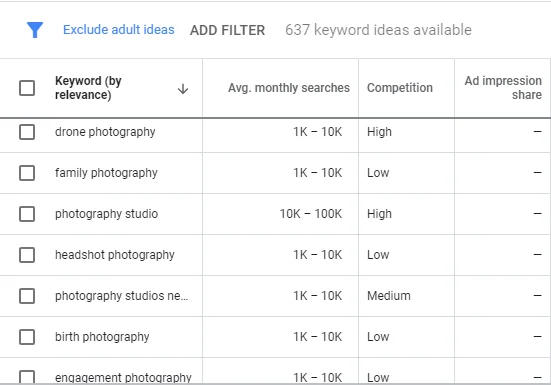
Unlike other paid tools, the data you receive is directly from Google. However, the only worrisome part, it is designed to offer keyword data that is helpful for paid ad campaigns and not for SEO. Still, you can use it for keyword research.
For example: Enter the keyword “Photography Services” in GKP and you will get a list of relevant keywords.
Now you can pick the keywords getting higher average monthly search volume and that are relevant to your business.
If you are not satisfied with the results generated by Google Keyword Planner, you have an option to use paid keyword research tools.
Searching for business-relevant keywords using SEMRush is simple and saves time.
You can directly dwell into keyword research by entering your primary keyword or you can use the URL of your competitor to find ranking keywords they are using and you are missing out.
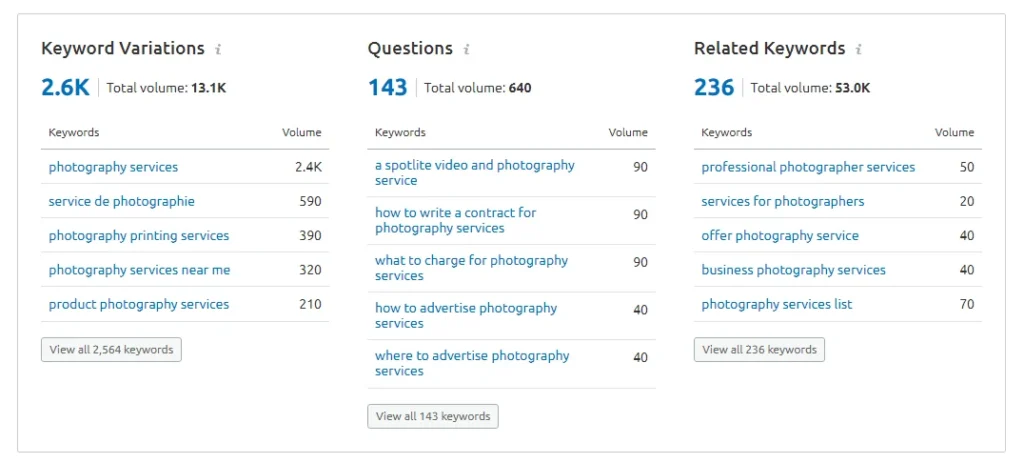
You get to know keyword variations, questions asked around your keyword and a variety of related keywords used by people in the past.
Choose keywords accordingly to strategize your SEO and content marketing campaigns.
Long-tail keywords are very much effective for a brand-new website or when you want to use less competitive keywords.
Usually, a longtail keyword is divided into head, body, and long tail.
For example: ‘Photography services’ act as head, because it is more competitive. ‘Photography Services in Austin’ is Body as it has medium competition. ‘Creative Photography Services Near Me’ is a long tail and will have less competition

TIP: When it comes to keyword types, there is no best category. Each, Head, Body, and Long-tail keywords have their pros and cons. However, when it comes to competition, long-tail keywords win the race due to less competition and high conversion.
After deep keyword research, you will get a long list of keywords, but picking the right keywords is a brainstorming task as there is no tool for that.
You need to analyze each keyword independently based on different factors and then pick the ones that are more suitable, relevant, and effective for your business.
Let’s see how to analyze keywords and on what factors.
Understanding search volume is not rocket science — the more people search a keyword the more it converts into traffic. It is hard to define good search volume as search volumes differ at much extent between different niches.
For example: When you search for a long-tail keyword “Best Action Movies” related to the entertainment industry you get a search volume of 10K – 100K.

Similarly, if you search for a long-tail keyword “Best Protein Supplement” related to the Fitness & nutrition industry you get 1K – 10K average monthly searches.

This is why you have to focus and retrospect search volume according to the industry you are working in.
When you want to find keywords then search volume is not everything. Nevertheless, a Google search result page is packed with everything from snippets to ads. Moreover, the number of ads displayed on search pages is increasing day-by-day.
Long story short, it is mandatory to analyze organic click-through-rate for all the keywords getting clicks from first page rankings.
Here is how to do it
Find the Search Engine Result Page for the keyword you plan to use.
If you find a whole lot of stuff related to that keyword from multiple keyword ads to featured snippets. You better understand that you will never get estimated clicks for that keyword even if you are ranking at number one in SERP.
Use a paid keyword research tool to find the organic CTR of the keyword.
Tools like MOZ, SEMRush, Ahrefs are proven to provide precise organic click-through-rate.
It is good for a website in its infancy to target low competition keywords. It helps to boost the domain authority of your website.
Once the authority of your website is increased and started receiving steady traffic, move your attention towards high competition keywords.
Cost-per-click or CPC is a major metric to find suitable keywords as you get to know if people, in reality, are spending money on that specific keyword.
Thus, even if a keyword has good search volume but negligible CPC then it is better not to opt for that keyword.
Keywords with high commercial intent play a major role in SEO and overall marketing campaigns. Therefore, sometimes targeting a keyword that has low search volume but high CPC makes sense.

For example, the keyword ‘Pre-wedding Photography’ has a search volume of only 140 but people are spending $5.03 each time a searcher clicks on an ad containing that keyword.
While finding keywords, it is necessary to find if that keyword is relevant to your business or not. Focus on keywords that will convert visitors into leads.
Although CPC helps you understand the worth of a keyword, you need to analyze if it is going to help you or you are just wasting time in optimizing your website for that keyword.
For example, the keyword ‘Photography classes’ have a search volume of 22200 and a CPC of $5.5 but you do not provide photography classes. Does it make sense to integrate that keyword on your website?
Keyword research has always been the first and most critical part of a Search Engine Optimization strategy. Before you start writing content or optimizing your website, it is mandatory to identify the high-value and converting keywords relevant to your business.
This blog is meant to help you understand the basics of keyword research and how to go about it. At first, you might find it difficult to and time-consuming to go through all the details, statistics, comparisons, and lists. But over time you will master the skill. So, let’s kick-start keyword research and find the keywords that will pay off handsomely in the future.
If you liked our content, please share it!

Book A Quick 15 Minute Call,
And We’ll Show You How To Unlock The Power Of Every Conversation.


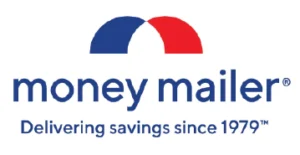




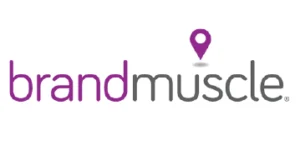




















©2025 All rights reserved – Convirza